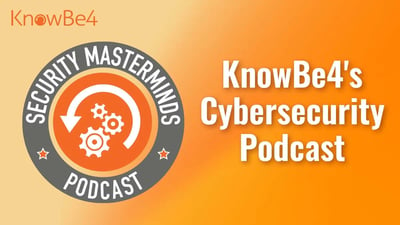 Artificial intelligence (AI) in the cybersecurity realm is a nuanced topic. On the one hand, it has the potential to enhance our abilities to detect and prevent cyber threats significantly.
Artificial intelligence (AI) in the cybersecurity realm is a nuanced topic. On the one hand, it has the potential to enhance our abilities to detect and prevent cyber threats significantly.
AI systems can process and analyze vast amounts of data quickly and accurately, enabling us to spot anomalies and risks much faster. It ultimately gives us a more efficient, proactive approach to cybersecurity. However, integrating AI also brings about particular challenges and concerns related to job security, the spread of misinformation, and ethical dilemmas.
In our episode of Security Masterminds with Clint Bodungen, he believes that the benefits of AI in cybersecurity outweigh its potential drawbacks. According to Clint, AI can augment the abilities of cybersecurity professionals, making certain tasks faster and more efficient. He acknowledges concerns related to job displacement, but views AI as something that can create new opportunities rather than eliminate jobs.
Moreover, he addresses the issue of AI-replicated voices and realistic-looking phishing emails. While these tools can indeed be used for nefarious purposes, AI technology can also be harnessed to detect and combat such fake content. Clint's perspective brings a balanced view to the AI-cybersecurity dynamic, encouraging responsible and cautious implementation.
Keep reading if you have ever struggled with outdated training methods or felt overwhelmed by the rapidly evolving AI landscape. Clint will address the pain points of ineffective training and the challenges of navigating AI technology, providing practical solutions and insights to help you advance your skills and stay ahead in the cybersecurity field.
Tradition Vs. Frequent Training
Traditional training methods for cybersecurity, while well-intentioned, have certain limitations. For instance, traditional methods often focus on theory at the expense of practical application. As a result, trainees may be well-versed in concepts but need help implementing them in real-world situations. Furthermore, many traditional training programs should be more frequent, and the opportunity for practice and skill improvement should be increased.
Clint sheds light on these limitations in the podcast, emphasizing the need for training evolution. He argues against the widespread practice of annual training exercises in favor of more regular and continuous sessions. Clint asserts that the key to effective training is frequency and practical immersion, like military or martial arts. Such an approach can significantly improve cybersecurity skills and, consequently, performance under stress.
Frequent Hands-On Training
In an ideal scenario, cybersecurity training would be a hands-on, real-world experience that allows professionals to apply what they learn practically. This approach prioritizes application over theory and helps trainees develop skills and solve problems more efficiently in an actual cybersecurity incident. Ideally, training sessions should also be regular and frequent, following the military or martial arts model, to ensure proficiency and excellence.
Discussing this approach to training, Clint sheds light on his platform, which integrates gaming technology and industrial control systems, providing individuals with hands-on training in areas like process control, security, and ICS cybersecurity. Clint firmly believes in shifting from traditional, annual training exercises to more frequent, engaging, and immersive training methods that keep skills sharp and up to date. This approach improves skills and prepares professionals to perform more effectively under stress.
Deepfakes and Misinformation
The spread of fake information, or misinformation, is a growing concern in our digital era. With AI technology's ability to create realistic-looking content, there is a heightened risk of people falling prey to misinformation. Moreover, AI technologies like deepfakes make it easier for malicious actors to spread harmful content and conduct phishing attacks.
While acknowledging AI's potential misuse, Clint contrasts it with its ability to detect and fight fake content. He asserts the importance of critical thinking, urging individuals to verify any information before believing or sharing it. The conversation around misinformation and AI's role in it is not one-sided, but rather, it provides a springboard for fostering awareness and responsibility in our digital landscape.
Embrace AI and Frequent Training
As cybersecurity professionals, we all strive for improved practices and a better understanding of the technologies we work with. That is why cybersecurity training that incorporates AI is crucial. The intersection of these fields presents a unique opportunity to enhance our knowledge and skills, equipping us with the tools to defend against sophisticated cyber attacks proactively.
By embracing this training, we can develop a security culture within our organizations that is both adaptable and forward-thinking, positioning us as leaders in the cybersecurity industry. Remember, through continuous and frequent learning and development, we can make a difference and protect our digital world.
You can listen to the episode with Clint below on our Security Masterminds Podcast website!
Want to cut & paste the link in your own browser?: https://www.buzzsprout.com/1892704/13880529





